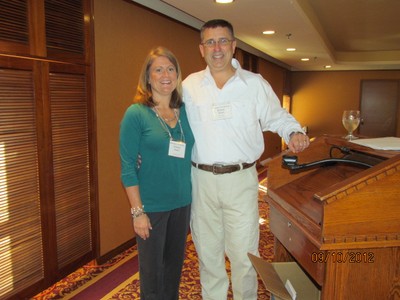Marriage is one of the most challenging things anyone can take on in life. Add the unique demands of military life to the mix, and it can make finding success in marriage even more difficult.
At the same time, having family support can be crucial for members of our armed forces. The Air Force is hoping to help families succeed with a program called MarriageCare. Participants in the recent annual retreat here of the Presbyterian Council for Chaplains and Military Personnel (PCCMP) were briefed on the program.
“Probably 75% of Air Force personnel are married, but the divorce rate for them is much higher than the norm,” says the Rev. Robert Ward, a PC(USA) minister and active duty Air Force chaplain who is MarriageCare facilitator for the Air Force Chaplain Corps.
MarriageCare, a program of the Chaplain Corps designed to nurture marriages, is offered in retreat format by trained facilitators. Ward and his wife, the Rev. Victoria Isaacs ― also a PC(USA) minister ― went through the program as participants and were both trained as facilitators in April of 2011.
They had the opportunity to go through it again as observers and have since led the program twice, most recently at Tyndall Air Force Base in August. They will co-lead another MarriageCare retreat this month in Winnipeg, Canada.
“It is an honor to be able to lead these retreats, as they were developed to strengthen the marriages of our Air Force families,” says Isaacs.
Ward and Isaacs are a good fit for the role of facilitators. They have been through the program personally and as Presbyterian ministers have a background and understanding of pastoral care.
“It’s about both spiritual and communications skills. All ages and experiences come to the retreat,” says Ward.
The fact that they are a husband and wife team also helps because they understand the unique challenges faced by both spouses in military marriages.
Ward understands the stresses of having to juggle military and family life. He understands having to be away from spouses and children on deployment, both from ministering to military personnel and from personal experience.
Isaacs understands the challenges faced by spouses (note spouses, not wives ― some are husbands). Military assignments are two to three years, no longer. Every time the military member has to move, so does the spouse and family. This makes it difficult for the spouses to have their own careers, friends, and connections. When military members deploy, spouses are left behind to care for the home and children by themselves.
All of these issues put strains on a marriage.
There is one more unique perspective Ward and Isaacs bring to the program: they also understand the rewarding nature of military life.
In 2003, Ward was stationed in Spain and began to consider the toll the military lifestyle had not just on Isaacs but on their two children as well. He made the decision to separate from the Air Force and joined the Colorado Air National Guard. He and Isaacs began serving as associate pastors at a church in Denver.
“It was not long before we both realized how much we missed the military community, the ministry to our military families, and being part of the mission to support those who are serving our nation in a time of war,” says Isaacs.
Ward re-entered the Air Force in 2005. Although there are challenges to military life, there are also rewards and in the eyes of Ward, Isaacs, and their family, the rewards outweigh the sacrifice.
Toni Montgomery is a free-lance writer and frequent Presbyterian News Service contributor in Statesville, N.C., where she also serves as church secretary for First Presbyterian Church of Statesville.

